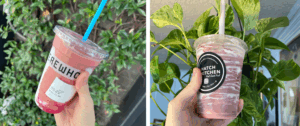What Hailey Bieber smoothies and instant matzo ball soup reveal about American Jewish taste
If the kosher deli is out, what’s taking its place?

Nooish’s kosher instant matzo ball soup is…actually really good. Photo by Louis Keene
It has become exceedingly difficult to get a bowl of kosher matzo ball soup in my L.A. neighborhood. I’m reminded of this every few months, when a cold or a craving reminds me what we lost when Pico Kosher Deli, established in 1968 about a mile from my apartment, closed for good early in the pandemic. It’s not just the soup, of course. It’s the whole kosher deli experience — bulging pastrami sandwiches, a waitress with a notepad, frilly toothpicks.
The traditional kosher deli is dying, if not dead, and not just in L.A. Kosher Ashkenazi fare is officially passé, a cuisine category today’s balabustas — at least my millennial Modern Orthodox cohort — have abandoned. At the kosher markets, Manischewitz products are relegated to a dusty corner, the “kosher aisle” of the kosher grocer. And at surviving delis like Katz’s and Canter’s, kosher is not a religious certification. It is, simply, a nostalgia cue immediately preceding the word “style.”
Fortunately, a wave of new, smartly packaged foodstuffs capitalizing on that nostalgia has arrived to restore my Ashkenazi birthright, or at least my former sodium levels. In the years since my neighborhood deli closed, direct-to-consumer brands have launched to hawk kosher potato latke crisps, kosher matzo chips and kosher jarred charoset (lovingly named Schmutz). The newcomer that I sprung for was a kosher instant matzo ball soup called Nooish. A box of four stout, colorful soup cups arrived about a week after I ordered them online.
To find out why these shelf-stable products have taken off while delis languish, I called Nate Rosen, whose official title — creator of the consumer brands newsletter Express Checkout — obscures the coolness of his job, which largely consists of reviewing new snacks on TikTok. According to Rosen, the kosher renaissance was part of a broader surge of food startups during the pandemic, when free time and disposable income were suddenly in abundance. It was inevitable someone would find the Jewish angle on the trend.
“There’s a market for it,” Rosen said. “There’s dedicated spots for it [on shelves]. And I think especially now, people are proud to be Jewish and proud to show that off a little bit.”
Nooish’s instant soup, ready in just a couple minutes, doesn’t come with booth seating. But taste-wise, comfort-wise and deli-wise, it’s a worthy adaptation of the experience. The kneidlach — three to a cup, each a bit larger than a Ping-Pong ball and floating in a salty brown broth, hold their form but obey your spoon. (There’s no chicken, and the soup is certified pareve.) At four-for-$36, the instant soup is probably too pricey for your kid’s lunchbox, and not substantial enough for an adult meal. But in a pinch — say, a cold or a craving — it can be transporting.

If the kosher deli is out, what’s in? The answer awaited me at Hatch Kitchen, a new kosher meat restaurant, where earlier this week I watched a barista prepare a fancy smoothie. Elaborate, astonishingly expensive and often named after celebrities, fancy smoothies are an L.A. institution, the lifeblood of the influencer class. The most notorious of these drinks, the upscale grocery chain Erewhon’s Hailey Bieber smoothie, contains strawberries and dates but also vanilla collagen powder and something called sea moss gel. It costs $20.
Hatch, I was told, makes something similar, the strawberry-based “Or-gan-ic” (the middle syllable also the Hebrew word for garden), which the restaurant calls its “most viral smoothie.” No sea moss gel, but the menu touts “anti-inflammatory” ingredients that include flax seeds and hibiscus. It’s $12, which sounds like a lot if you’ve never spent $20 on a smoothie before, and like a bargain if you just did, and for that one you’d had to look a cashier in the eye and utter the name of Justin Bieber’s wife. (At Hatch, you order from an iPad.)
Hatch’s fancy smoothie — which is also a photogenic one — models the dominant trend in contemporary kosher dining: pop-culture mimicry. Across from where the Pico Kosher Deli once stood, you can order a kosher crunchwrap supreme — a Taco Bell menu item — from a Mexican street food place called Lenny’s Casita. Kosher cafes still serve bagels, but people go for the avocado toast. It’s kosher dining’s hypebeast era, if you can afford it; Lenny’s crunchwrap with beef runs $30. I’m not sure how close the knockoff is to the real thing, or whether proximity really matters. Most customers will never taste the alternative.
There’s a tension inherent in these appropriated menu items — affirming both the desirability of secular culture and the Jewish laws forbidding it. Cultural diffusion and communal retreat. Assimilation and resistance. Meanwhile, the ancestral cuisine, which emerged out of kosher dietary laws, has been simultaneously rejected and idealized. You can’t find too many kosher delis, but TikTok has popularized pickle fountains. (Wait until they find out about hamantaschen.)
I was sort of sad about this state of affairs until I spoke to David Sax, who was dismayed enough about the decline of delis to write a book about it. He explained that Jewish deli food developed as a way of transforming European deli methods and flavors, which were more often made with pork, into kosher adaptations. The corned beef sandwich was the original fancy smoothie, which means our kosher crunchwrap might become tomorrow’s matzo ball soup. The comfort food changes, but the people endure.
















